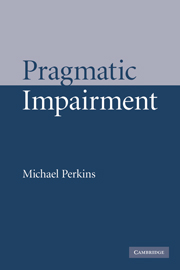Book contents
- Frontmatter
- Contents
- List of figures
- List of tables
- Acknowledgements
- Transcription conventions
- 1 Introduction
- 2 Pragmatic theory and pragmatic impairment
- 3 Pragmatics and modularity: components, dissociations and associations
- 4 Pragmatic ability and disability: an emergentist model
- 5 Cognition and pragmatics
- 6 Language and pragmatics
- 7 Sensorimotor systems and pragmatics
- 8 Compensatory adaptation
- 9 Conclusions
- Appendix
- References
- Index
4 - Pragmatic ability and disability: an emergentist model
Published online by Cambridge University Press: 22 September 2009
- Frontmatter
- Contents
- List of figures
- List of tables
- Acknowledgements
- Transcription conventions
- 1 Introduction
- 2 Pragmatic theory and pragmatic impairment
- 3 Pragmatics and modularity: components, dissociations and associations
- 4 Pragmatic ability and disability: an emergentist model
- 5 Cognition and pragmatics
- 6 Language and pragmatics
- 7 Sensorimotor systems and pragmatics
- 8 Compensatory adaptation
- 9 Conclusions
- Appendix
- References
- Index
Summary
Introduction
In this chapter I will present an account of pragmatics which incorporates all the features identified in Chapter 2 as being required to account for pragmatic impairment, and which at the same time covers normal pragmatic processing. The approach used is an emergentist one and draws on interactional processing accounts as outlined in Chapter 3. Pragmatic competence is not a unitary phenomenon (McTear and Conti-Ramsden, 1992; Penn, 1999). It requires the integration of a range of cognitive, semiotic and sensorimotor abilities, and impairment of any of these can result in pragmatic impairment. Nevertheless, the term ‘pragmatic impairment’ tends to be used rather more narrowly to refer to the type of sociocognitive impairment found in autism and right hemisphere brain damage. What I argue in this chapter is that pragmatic impairment results when there is a restriction on the choices available for encoding or decoding meaning, whatever they might be. These choices are characterized in terms of the semiotic, cognitive and sensorimotor capacities which underlie communicative behaviour. Pragmatic impairment is seen in terms of an imbalance within and/or between interacting cognitive, semiotic and sensorimotor systems, and also in terms of compensatory adaptation. As well as taking into account interactions within the individual, the proposed model also extends into the interpersonal domain such that a communicative dyad can also be seen as an integral cognitive, semiotic and sensorimotor processing system in its own right.
- Type
- Chapter
- Information
- Pragmatic Impairment , pp. 51 - 69Publisher: Cambridge University PressPrint publication year: 2007



